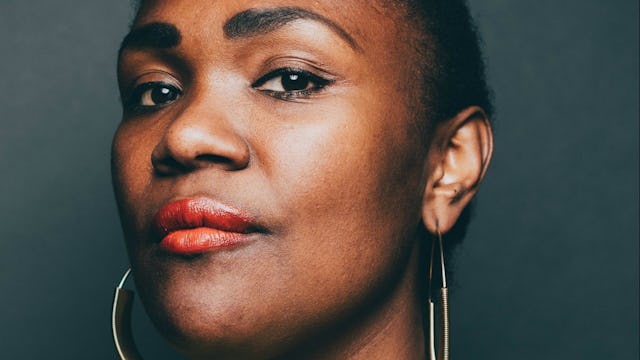What I Have To Say To My Fellow Black Women Who Support Sexual Abusers

These last few weeks have been almost unbearable for those of us who are triggered by conversations of sexual assault. Between the #SurvivingRKelly docuseries showing the lack of concern for the safety of Black women and girls, the arrest of Chris Brown on rape charges, and the countless retellings of sexual abuse that have been in the news, I’ve had trouble sleeping, to say the least.
I spent much of the time that would have been dedicated to rest or work thinking about the ways I’d unknowingly gotten comfortable with a culture of abuse. Each story left me even more upset with myself for not paying attention to the signs, including but not limited to, all the sexual comments I’d been socialized to accept from early childhood into adulthood.
It’s painful enough to reflect on the obvious and non-obvious you’ve experienced through the years. It’s frustrating to recount the time’s guys “convinced you” to do things you had no interest in but you did them anyway because it was easier to have sex with someone than face the fear of what could happen if you said no. And it’s downright heartbreaking to think about the fact you just gave birth to a daughter who will likely have to face the same disgusting rape-apologist culture that haunted you and damaged your sense of self.
More than 63% of sexual assaults are never reported. And only somewhere between 2-10% of rape allegations are false. Our sisters, daughters, and friends aren’t making this stuff up. The reason for such a huge level of silence is the conversations we overhear every day.
Of the many negative sexual experiences I’ve had, all ranging in severity, more often than not I chose to be in the 63%. I didn’t expect anyone to believe that a summer coach’s son, a popular high school guy who rode my bus, or a former neighbor I had a crush on, would take it too far. I didn’t feel worthy of anyone’s belief.
It was easier to be silent than prove my boundaries had been invaded and someone seen favorably in so many folks’ eyes would try to take something they didn’t have a right to. My list of horrors is comprised of panic-inducing extremely close calls while many others have experienced far worse. There were a couple of times I ended up saying multiple no’s and feeling powerless until I said a yes, but it could have been much worse.
But there was one time that stood out. The summer after 9th grade, a camp coach at least 4 times my age said something that didn’t feel right. After days of feeling uncomfortable and unsure what to do, I told my aunt what he said. And she believed me.
She and I met with him and the camp facilitator. Naturally, he denied it and gave me dirty looks for the rest of the camp. I don’t know if he was formally disciplined, but the important part to me was my aunt believed me. And I’ll never forget what it felt like to be heard.
If we don’t hear each others’ cries, who will?
I am absolutely NOT surprised by the Black men in my community who made excuses or enabled young children like myself to be abused. It’s disgusting yet expected. Men, regardless of race, are invested in and benefit from male privilege. Like all privileged groups, they often use that privilege to deny others what they deserve — and often, that thing is one’s peace of mind.
But what does hurt me, are the Black women — the Taraji P. Hensons and the Erykah Badus — who openly voice support to proven abusers and turn their backs on survivors.
There are no words to describe how it feels watching Black women invalidate other Black women’s experiences. Do you know why? Because we are all we have.
Black women exist alone on an island surrounded by institutional and systemic injustice. Black men are often in solidarity with one another for “male issues” and request that we stand and combat racism while ignoring the impact of womanhood on our life experiences.
White women unite for women’s marches, but often overlook the impact of our race and the impact it has had on our devalued status as women since being forced to inhabit and be abused in this country.
Neither group represents our interest, so Black women have always stood together and advocated for one another. Other Black women understand what it’s like to feel like you have no one in your corner. We’ve experienced the irony of being some of the most vulnerable while being blamed for the inadequacies of our community. So, when I hear of Black women — especially those with influence — stepping on the pain of our fellow sisters, I’m flabbergasted.
I look to my sisters for my help. And we’ve got to keep prioritizing the experiences of our sisters over the interests of the patriarchy. You never know what secret someone was about to confide in you before you voiced your support for [insert whatever man here]. We have no idea what pain and trauma someone was doing their best to shake before you revealed you weren’t a safe person to talk to. And you will never get the opportunity to rebuild that bridge.
This is why Black girls and women are being abused by their uncles, friends, and even fathers while battling mental health consequences with no one to talk to.
BELIEVE SURVIVORS. Even if the person who hurt them is someone you love.
BELIEVE SURVIVORS. Even when it’s convenient and makes your favorite music artist look bad.
BELIEVE SURVIVORS. Even if it means you will have to end a relationship.
Please make sure you hear and listen to your sisters. No one else is fighting for us, so we have to fight for ourselves.
This article was originally published on